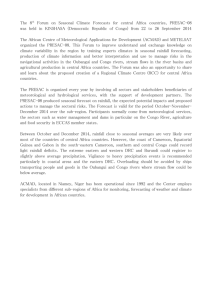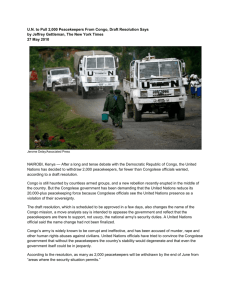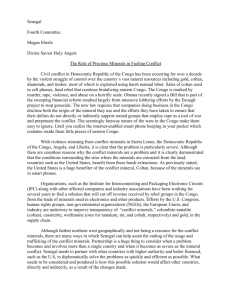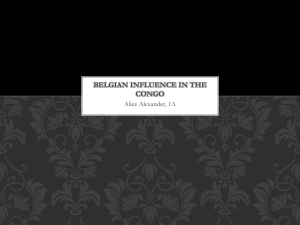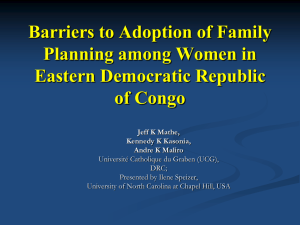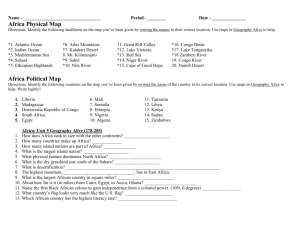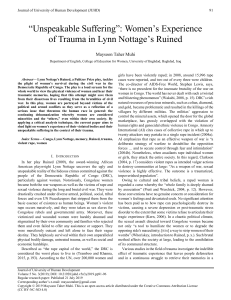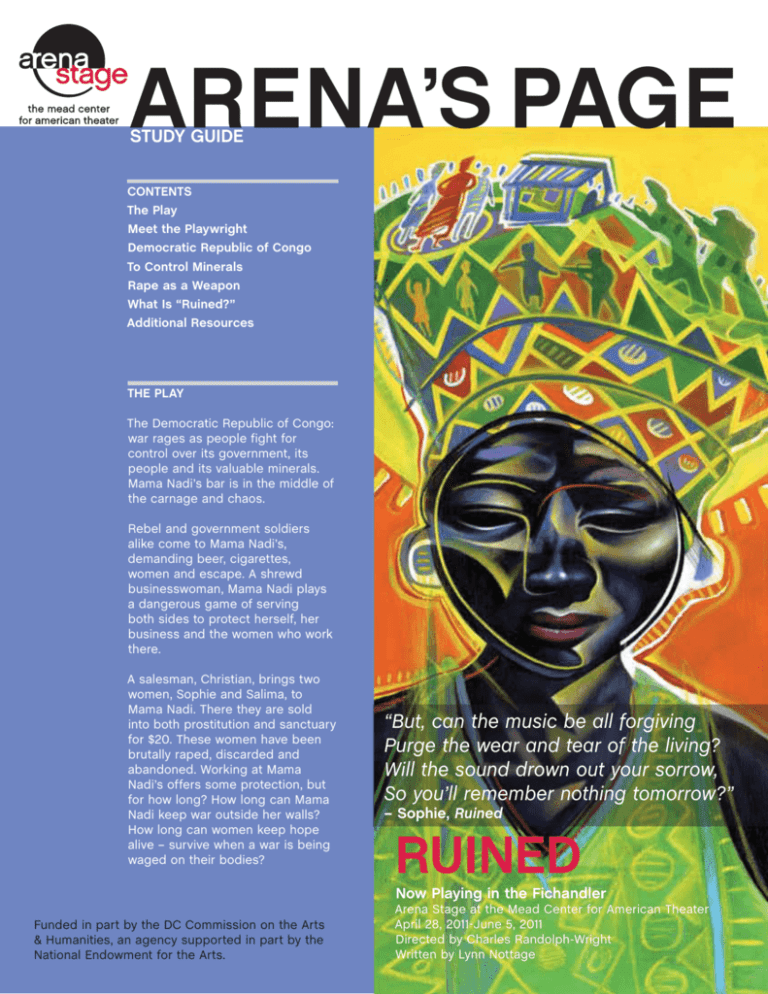
arena’s page
study guide
Contents
The Play
Meet the Playwright
Democratic Republic of Congo
To Control Minerals
Rape as a Weapon
What Is “Ruined?”
Additional Resources
The Play
The Democratic Republic of Congo:
war rages as people fight for
control over its government, its
people and its valuable minerals.
Mama Nadi’s bar is in the middle of
the carnage and chaos.
Rebel and government soldiers
alike come to Mama Nadi’s,
demanding beer, cigarettes,
women and escape. A shrewd
businesswoman, Mama Nadi plays
a dangerous game of serving
both sides to protect herself, her
business and the women who work
there.
A salesman, Christian, brings two
women, Sophie and Salima, to
Mama Nadi. There they are sold
into both prostitution and sanctuary
for $20. These women have been
brutally raped, discarded and
abandoned. Working at Mama
Nadi’s offers some protection, but
for how long? How long can Mama
Nadi keep war outside her walls?
How long can women keep hope
alive – survive when a war is being
waged on their bodies?
“But, can the music be all forgiving
Purge the wear and tear of the living?
Will the sound drown out your sorrow,
So you’ll remember nothing tomorrow?”
– Sophie, Ruined
Ruined
Now Playing in the Fichandler
Funded in part by the DC Commission on the Arts
& Humanities, an agency supported in part by the
National Endowment for the Arts.
Arena Stage at the Mead Center for American Theater
April 28, 2011-June 5, 2011
Directed by Charles Randolph-Wright
Written by Lynn Nottage
Meet the
Playwright
From the Playwright’s
Perspective
“
They [students] respond to the play because the characters by and large are
teenagers – they are 18-year-old girls and 18-year-old boys who are in the
midst of a struggle that is probably no so distant from what they are going
through in their own lives, but the context is profoundly different.
“African-American women
have effectively been
locked out of writing for
film and television, and
thankfully the theater
has been more open to
embracing our stories.”
— Lynn Nottage, Playwright
Lynn Nottage was born in
Brooklyn, New York, in 1964.
Inspired by the women in her
family and neighborhood, she
wrote her first play when she
was just 8 years old.
After attending Brown
University as an undergraduate, Nottage went on to earn
a degree in playwriting from
Yale School of Drama. Nottage
spent four years at Amnesty
International (an international
human rights organization) as
the national press officer.
Nottage has received numerous awards, including the
Pulitzer Prize for Ruined in
2009. She recently spoke
at a public reception in
Washington, D.C., about rape
and violence against women in
the Congo.
Pulitzer Prize – a prestigious
U.S. award for achievements
in newspaper and online journalism, literature and musical
composition
“I also think it’s important for young students to think more globally. One of the
things that I learned throughout my travels is that folks overseas engage with the
world much more readily than we do in the United States. You’d be hard-pressed
to ask an American student to name all the countries in Africa. They would be
hard-pressed to answer who are the presidents of certain countries and what
are the natures of their conflicts. It is extremely important, if we want to continue
as a culture that values education and learning, to understand that we don’t live
in isolation and that what happens overseas impacts us.” – Lynn Nottage
Making the
Global
Personal
W
hen war, conflict or human
rights violations happen
in another country it can
be tempting to think of the people
involved as being very different
from you, to make the conflict
more distant. Here are faces of
other young people affected by the
conflict in the Democratic Republic
of Congo. l
Activity
A country is more than its
conflicts. Research the
human and natural resource
potential of the Democratic Republic
of Congo. Find pictures of the country
and Congolese people. Listen to
Congolese music. What do Congolese
thinkers, artists and citizens have
to say about their country? Based
on your research, what is a more
complete view of the DRC?
Ituri Conflict
T
he Ituri region is located in northeastern DRC. It is the site
of the Ituri Conflict, a longstanding clash between two
ethnic groups: the Hema and Lendu. Historically, part of the
conflict exists because one group farms and the other herds,
leading to fights over land use. The conflict worsened with the
Second Congo War of 1998, when ethnic tensions were stoked by
neighboring countries who invaded the Congo, which escalated
fights over natural resources.
In the play, Salima is Hema and was assaulted by Lendu men. l
Democratic Republic of Congo
“You’re in the Congo. Things slip
from our fingers like butter.”
— Mama Nadi, Ruined
T
he Democratic Republic of Congo
(DRC) is a country located in central
Africa. A mineral-rich country, it is part
of the second-largest rainforest in the world.
Of its population of 65 million, half are
under age 18. The DRC was once colonized
by Belgium and has been exploited for its
natural resources for centuries.
Although the country gained independence
from Belgium in 1960, the DRC has erupted
in multiple civil wars. Prime ministers have
been assassinated, a dictator installed and
overthrown, and neighboring countries
have invaded. All these have resulted in the
deaths of millions of Congolese people.
Although a peace agreement was signed
in 2003, fighting between rebel and
government groups still rages in eastern
Congo. It is estimated that 45,000 people
in the DRC die every month, and nearly 6
million have died since 1996 as a result of
the conflict. l
Activity
Locate the Democratic Republic
of Congo on a map of Africa.
Notice the countries that
surround it. How does its geographical
location partly explain why it has been the
center of so much conflict?
To Control Minerals:
The Example of Coltan
“Six months ago it was just more
black dirt. I don’t get why everyone’s
crawling over each other for it.”
— Mama Nadi, Ruined
C
oltan is short for columbitetantalite, a tarlike mineral
found in the DRC. The Congo
has approximately 64 percent of the
world’s reserves of coltan. When
refined into a powder, coltan is
used to regulate the flow of electric
currents in cell phones, computers
and other electronic devices. It is
widely used in countries like the
United States.
A recent report by the United Nations
says that all parties involved in the
conflict have been involved in the
mining and sale of coltan. The money
rebels and militias receive from these
sales helps them buy more weapons
and supplies for the war. According
to four studies by the United
Nations, local militias, neighboring
countries, government soldiers, and
multinational corporations all benefit
from Congo’s minerals and contribute
to the fueling of the conflict. This
includes the United States.
Because mining and selling minerals
such as coltan is an important
source of income for the local
population in the war-torn country,
there is much competition and
fighting over mineral sites.
In this way, coltan and other minerals
pay for the continuation of violence
and conflict in the Democratic
Republic of Congo. l
Modern Uses of Coltan
How many of these items
do you own or use?
Laptops
Cell phones
Jet engines
X-ray film
Hearing aids
Digital cameras
Game consoles
Activity
Often we use goods
and services and don’t
consider their sources.
Make a list of your five favorite
items (ex. your sneakers, your
favorite fast food, etc.). Research
where the materials for these items
come from and where they are
made. What surprised you about
your findings?
Rape as a Weapon
S
ince fighting broke out in DRC in 1996, hundreds
of thousands of women have been victims of
sexual violence. Sexual violence is often called
a weapon of war and is not unique to this conflict;
it has been used throughout history and the world.
U.S. Secretary of State Hillary Clinton has declared
it a weapon of mass destruction. It is not only a
byproduct of war but can be systematic and strategic.
Rape is not about sex. Instead, it is a way to:
• terrorize and divide a community. These brutal
acts are sometimes performed in front of family
members and other witnesses.
• show power and strengthen control. A woman can
be raped by one man or many, repeatedly, over a
long period of time. She is helpless to stop this.
• carry out “ethnic cleansing.” Men purposely
impregnate women of a different ethnic group to
slowly but surely genetically eliminate that group.
This use of rape cannot be verified in the case of
the Congo, but is documented in other conflicts
such as the Bosnian War in the 1990s in Europe.
During war, men can commit these crimes with little
fear of punishment. Their victims cannot or will not
identify them and, even if they could, who will punish
them when a country is at war? l
What is
“Ruined?”
Real-Life Accounts
of Congolese
Women
S
ophie has been raped with a bayonet (see picture).
Her sexual organs are permanently damaged. She
doesn’t have money for medical treatment. She is
“ruined.” This is the specific definition of “ruined” within
Lynn Nottage’s play. However, in more general usage,
“ruined” has also been applied to rape victims.
“I was made poison by their fingers, that is
what he said. He had no choice but to turn
away from me, because I dishonored him.”
– Salima, Ruined
“Ruined” goes beyond physical abuse. Women must
also deal with the psychological pain of the abuse. In
the DRC victims can range from 3 to over 75 years old.
“Ruined” women can be shunned by their families
and communities. They can be treated as dirty and
worthless. They can be told that no one could love them
or want them, that they are to blame. What other
meanings of “ruined” have you heard?
What else can happen to a “ruined”
woman? Can men be “ruined?” l
A bayonet is a knife
modified to fit on the
barrel of a gun
Activity
Major media outlets have covered violence
against women in the DRC. Human rights
organizations have made information and
personal accounts easily accessible. Research this tragedy
online. Find one thing you can do to help end the violence.
Fistula: physical damage
F
istula is torn and damaged tissue in the vagina and
anus. In rape cases, this damage sometimes can
be caused by bayonets, glass bottles, branches,
guns and bullets. After a group has finished raping a
woman, they may permanently damage her by one of
these means to send her back to her home with as much
damage and shame as possible. In some cases, the
physical damage can be treated with surgery. l
R
uined is based on interviews
with African women and
research about violence
in their countries. Lynn Nottage
spoke with women who had
stories similar to the following.
“We were accompanied by bodyguards for
everything, even when we went to the toilet. …
We had to be at the disposition of the man who
raped us all day. It was always the same man.
Even if I did not want to, I had to be his concubine
(sex slave). He always had his gun pointed at me
and threatened to kill me if I resisted him.”
– Therese
“One of the men hit me demanding that I lay
down. I refused. He continued to hit me ripping
off my clothes until I was subdued. While this
was happening, two men held my husband. My
children were present and in front of everyone,
they raped me.”
– Maman Nsimire
interviews courtesy of Friends of the Congo
Helpful Hints for Theater Audiences
As an audience member at the theater,
YOU are part of the show! Just as you
see and hear the actors onstage, they
can see and hear you in the audience.
To help the performers do their best,
please remember the following:
Arrive at least 30 minutes early.
Visit the restroom before the show starts.
Before the show begins, turn off your
cell phone, watch alarms, pagers
and other electronic devices. If
anything rings by accident, shut it off
immediately.
Save food and drinks for the lobby.
There is no eating or drinking inside
the theater.
Walk to and from your seat - no
running in the theater!
Do not talk, whisper, sing or hum.
Do not use cell phones for calls, text
messages, pictures or games.
ACTIVITY:
Here is the Fichandler Stage, a theater-in-the round with the
audience on all sides. How would you transform the space into
the setting for Ruined? Keep in mind that you must not block
views from the audience!
How can the stage be the bar, the bedroom and the outside?
Additional Resources
Books
No Mercy: A Journey into the Heart of the Congo by Redmond O’Hanlon
King Leopold’s Ghost by Adam Hochschild
The War Within the War: Sexual Violence Against Women and Girls in Eastern Congo
by Joanne Csete, Juliane Kippenberg, Human Rights Watch
The Congo from Leopold to Kabila: A People’s History by Georges Nzongola-Ntalaja
Keep your feet on the floor, not on
the seat in front of you.
Avoid getting up during a show
because it distracts your neighbors
and the performers. If you must leave,
wait for a scene change, then exit
quietly and quickly.
Performers appreciate enthusiastic
applause rather than whistling or
shouting.
Cameras and videotape are
prohibited because they are
distracting to the performers.
Enjoy the show!
On the Web
Friends of the Congo: www.friendsofthecongo.org
Women for Women International: www.womenforwomen.org
Women in War Zones: www.womeninwarzones.org
On DVD
Pushing the Elephant – documentary by Chicken & Egg Pictures
NIGHTLINE: Heart of Darkness – five-part series with Ted Koppel
Congo: White King, Red Rubber, Black Death – movie by Peter Bate
Lumo – a feature-length documentary about a young Congolese woman on an
uncertain path to recovery at a unique hospital for rape survivors
The Greatest Silence: Rape in the Congo – documentary by Lisa F. Jackson
For other research and articles
pertaining to Ruined, visit Arena
Stage’s Sub/Text: Your Virtual
Dramaturg at www.arenastage.org/
shows-tickets/sub-text/.
Research and accounts generously
provided by Friends of the Congo
and Women for Women. Arena
Stage’s study guide for Ruined is
part of its partnership with the DC
Arts and Humanities Council’s Live
to Read program.
1101 Sixth Street, SW
Washington, DC 20024
Phone: (202) 554-9066
Fax: (202) 488-4056
Written by Julia DePalma
Edited by Rebecca Campana
Illustration by Rudy Gutierraz
Visit www.arenastage.org
for more information on
Arena Stage productions
and educational opportunities.

